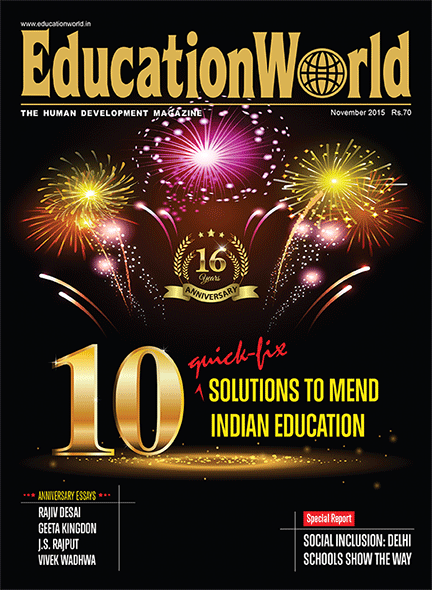 Congratulations to EducationWorld on your 16th anniversary. I have been following the magazine through the years and I compliment you and your team for doing a great job of highlighting the formidable challenges confronting Indian education.
Congratulations to EducationWorld on your 16th anniversary. I have been following the magazine through the years and I compliment you and your team for doing a great job of highlighting the formidable challenges confronting Indian education.
Your 16th anniversary cover story ‘10 quick-fix solutions to mend Indian education’ (EW November) is excellent for its sweep, focusing on problem areas from early years to higher education. However, I believe you have omitted a very important problem area of Indian education — excessive government regulation. From K-12 to higher education, government rules, regulations and licenses are obstructing the promotion of new schools and colleges and restricting efficient management of existing ones.
Constant government interference has already ruined the country’s publicly funded schools, colleges and universities and now the heavy hand of government is threatening private education institutions. EducationWorld needs to speak up fearlessly in favour of freeing Indian education from the stranglehold of education inspectors and politicians.
Deepak Malhotra
Mumbai
RTE benefit
Many congratulations to the EW team for completing 16 years of uninterrupted publishing!
I especially appreciated the special report ‘Social inclusion: Delhi schools show the way’ (EW November). It’s revealing that Delhi’s private schools are proactively implementing the RTE Act’s s.12 (1) (c) and admitting poor neighbourhood children. By including children from underprivileged families in their classrooms, private schools are providing middle class kids a unique opportunity to understand the trials and tribulations of the poor majority.
Hopefully when they grow up and occupy positions of power, they will go out of their way to reduce income inequality and alleviate poverty.
Anisha Mathur
Delhi
Personal matter
Re your Editorial ‘Ban online porn in under-developed India’ (EW September). Sex is a very personal matter and every individual has a right to privacy. I do not advocate a ban on online porn. Who is the government to decide what the public should watch?
It’s for parents and teachers to guide children and warn them against the dangers of pornography easily accessible on the internet.
Mahesh Kumar
Delhi
Insightful essays
Compliments on your superb 16th anniversary issue (EW November), full of insightful stories and essays. I specially enjoyed reading the columns of Rajiv Desai and Dr. Geeta Kingdon. Desai is brilliant in his analysis of how the country’s higher education system has failed to develop liberal values in students. The rising wave of intolerance in the country is being fuelled by the huge pool of unemployable graduates who have become foot soldiers of political and social organisations with vested interests.
Dr. Kingdon too has done a great job of exposing the country’s public school education system for what it is — threadbare and broken. Fudging of mark-sheets and cheating in exams has become a national malaise. It’s sad that we are unable to see and confront this reality.
Suresh Kumar
Chennai
Adopt international norms
I congratulate you for publishing the first comprehensive ranking of 693 Indian universities (EW May). The absence of Indian varsities from all Top 200 World University Rankings is a national concern, though this year the long awaited entry of an Indian institution into the global elite group has been achieved by Indian Institute of Science, Bangalore which is ranked #147 in the QS rankings.
I have compared the scores of different universities as published in your esteemed magazine under the parameter of research/innovation (300 marks). This assessment should have been based on international standards — research distinctions, awards, research grants from donors including industry (national and international), commercialisation of inventions, citation index (h-index), impact factor, patents, etc. I dare to say that many of the private universities ranked among the Top 100 do not meet the aforesaid parameters. I believe that in India we should also adhere to international norms.
Your efforts are laudable and your comprehensive ranking of India’s Top 200 universities is the best available. If you are able to rank universities according to international norms, it will be most valued and appreciated.
Prof. Prem Kumar Khosla
Vice chancellor, Shoolini University, Solan, Himachal Pradesh